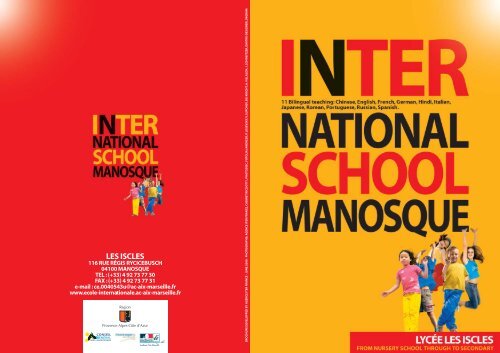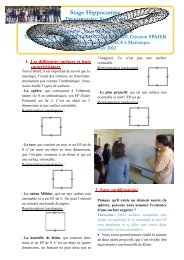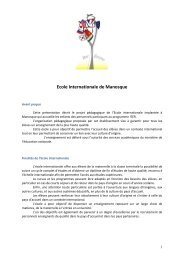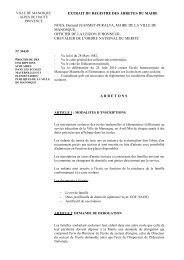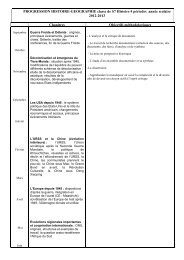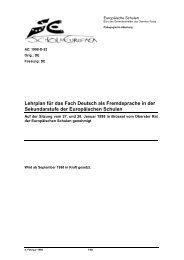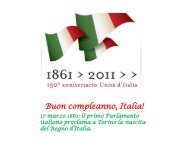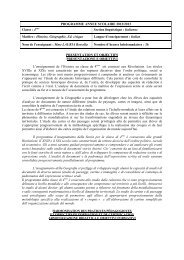School - Ecole Internationale de Manosque
School - Ecole Internationale de Manosque
School - Ecole Internationale de Manosque
- No tags were found...
Create successful ePaper yourself
Turn your PDF publications into a flip-book with our unique Google optimized e-Paper software.
LES ISCLES116 RUE RÉGIS RYCICEBUSCH04100 MANOSQUETEL : (+33) 4 92 73 77 30FAX : (+33) 4 92 73 77 31e-mail : ce.0040543u@ac-aix-marseille.frwww.ecole-internationale.ac-aix-marseille.frBROCHURE DEVELOPPED BY AGENCE ITER FRANCE - JUNE 2008 - PHOTOGRAPHS: AGENCE ITER FRANCE, CABINET RICCIOTTI , PHOTODISC, FOTOLIA (ANDRESR, P. LOSEVSKY, V. SUPONEV, BG-KNIGHT, A. VILLALON, J. SCHWEITZER, DMITRII-DESIGNER), INGRAM
The International <strong>School</strong> of <strong>Manosque</strong>The International <strong>School</strong> of <strong>Manosque</strong> isa French state school, but it has a number of exceptionalfeatures which make it unique.What makes this school so special?One single school, offeringhigh quality education to childrenbetween 3 and 18 yearsold.It follows an internationalcurriculum which leadsto universally recognizedhigh-school diploma givingentry to higher education.Bilingual teachingis provi<strong>de</strong>d in French and oneof the following six languages:Chinese, English, German, Italian,Japanese and Spanish. Newlanguage sections are planned tobe ad<strong>de</strong>d in future years: Hindi,Portuguese, Russian and Korean.Small classes ensurethat every pupil receivesindividual attention and support.From September 2008 the schoolwill offer intensive coursesin French and various sectionidioms, especially English andGerman, to all new pupils in thefirst seven weeks after their arrival,to facilitate their integration.The study programmeis flexible enough toaccommodate individual needs.With its 19 different nationalities,one of the key aspects of theschool is cultural diversity.Open-min<strong>de</strong>dness,tolerance and the respectof different cultures and beliefsare therefore amongstits core values.Over 50 teachersin September 2008 mostof whom are native speakers,who are very experiencedand highly motivated.New, environmentallysustainable, ergonomicbuildings, with a capacityof about 1000 stu<strong>de</strong>nts, in apleasant and calm environment,will house the school startingwith the primary sectionin September 2009, followedby the other sections in 2010.www.ecole-internationale.ac-aix-marseille.frwww.ac-aix-marseille.fr1 2
MANOSQUEA unique international schoolThe International <strong>School</strong> in <strong>Manosque</strong> will first and foremost be acceptingchildren whose parents work for the ITER project starting in Septembre 2007.The school is also be open to children from the region around <strong>Manosque</strong> whowould like to follow an international curriculum. This school will be offeringthese children the possibility of high-level education ranging from nursery schoolto secondary school, with an internationally-recognised high-school diplomaat the end.Un<strong>de</strong>r the authority of the Aca<strong>de</strong>mic <strong>de</strong>partments belonging to the FrenchMinistry of Education, bilingual teaching will be provi<strong>de</strong>d in French and in anyof the ten languages available (Chinese, English, German, Hindi, Italian,Japanese, Korean, Portuguese, Russian and Spanish). All children will have theopportunity to study in a first foreign language from Gra<strong>de</strong> 3 (or CE2) and asecond foreign language from Gra<strong>de</strong> 7 (or Cinquième in the French system).Stu<strong>de</strong>nts will also be able to choose a third foreign language – as an option –from Gra<strong>de</strong> 10 (or Secon<strong>de</strong> in the French system).In addition to French culture, special focus will be placed on opening onto othercultures and educational systems. Teaching in the arts and cultures will help to<strong>de</strong>velop open-min<strong>de</strong>dness, tolerance, respect of different values and beliefs.The proximity of Les Iscles to the final International <strong>School</strong> site – financed andbuilt un<strong>de</strong>r the responsability of the Provence - Alpes - Côte d’Azur RegionalCouncil – will contribute to the success of this unique intercultural project.In France, primary schooleducation provi<strong>de</strong>d in thenursery schools (also known aspre-primary schools) an<strong>de</strong>lementary schools is organisedinto three cycles. The first cyclecorresponds to the first twoyears of nursery school. Thesecond cycle inclu<strong>de</strong>s the lastyear of nursery school and thefirst two years of primary school.The third cycle corresponds tothe last three years of primaryschool.PRIMARY SCHOOLEDUCATION«If you talk to a man in a languagehe un<strong>de</strong>rstands, that goes to his head.If you talk to him in his language,that goes to his heart.»Nelson Man<strong>de</strong>la3 4
NURSERY AND PRIMARY SCHOOL TEACHINGThe primary school curriculum represents the first 8 years of education, inNursery and Primary schools.First & Second YEARS OF NURSERY SCHOOLCurriculum: 24 hours of classes a week (12 hours in the linguistic sectionchosen and 12 hours in French)Third YEARS OF NURSERY SCHOOL, CP (PRIMARY CLASS), CE1 (FIRST YEAR OF PRIMARY SCHOOL)Curriculum: Selected language, French/French as a foreign language, Citizenshipand social life, Mathematics, Sciences, Art and music, Physical education.Reading and writing represent at least 2 hours a day.CE2 (2 nd YEAR OF PRIMARY SCHOOL), CM1(1 st YEAR OF MIDDLE SCHOOL),CM2 (2 nd YEAR OF MIDDLE SCHOOL)Curriculum: Selected language, French/French as a foreign language, Historyand Geography, Sciences (Biology and Technology), Art and music, Physicaleducation, 1st foreign language (for children with a strong level in Frenchand in their selected language).The aim of the French as a foreign languagecourses is to give the pupils the level requiredto follow the classes given in French.Contact :SecretariatTel. : +33 4 92 73 77 30Email : ce.0040543u@ac-aix-marseille.frwww.ecole-internationale.ac-aix-marseille.frNURSERY SCHOOLChildren can attend nursery school from the age of 3 in thespecial classes provi<strong>de</strong>d for them at Les Iscles. Teaching innursery schools aims at <strong>de</strong>veloping their oral expression andproviding them with the basic learning skills for writing.Educational objectivesLearning is based on various principles:Creative aptitu<strong>de</strong> through handicrafts and exercisesin self-expression, language, music and dance,Sense of observation and logic,Artistic and cultural discovery.MealsAt lunchtime, different mealsare prepared by the schoolcaterer and served to nurserychildren and primary schoolstu<strong>de</strong>nts up to the age of 10.How can a childthat doesn’t speakFrench followlessons taughtin French?By teaching Frenchas a foreignlanguage in waysadapted to eachstu<strong>de</strong>nt so that he /she can follow theclass withoutdifficulty. Theseclasses will be offeredat all school levels(from nursery schoolto high school).QUESTIONS/ANSWERSMy child was born in November2004. Can he/she attend nurseryschool from September 2007?Yes, your child will accepted bythe nursery school provi<strong>de</strong>d anexemption has been granted.All children with their third birthdaybetween 1 September and 30 Juneof the school year can attend nurseryschool.Is nursery school compulsory?In France, there is no obligationto put your children in nurseryschool. Though it is not compulsory,most children regularly attendnursery school in France. However,children must be schooled from theage of 6 in primary school.Can I register my childat the canteen?All children enrolled at theInternational <strong>School</strong> may eatat the canteen. The cost of canteenmeals is set by the Iscles Boardof Directors (host schoolfrom 2007) for the pupils of juniorhigh school and high school andby the Municipal Council for thepupils in nursery and primaryschool.Is there a rest areain the International <strong>School</strong>?The school has an area reservedfor the youngest children where theycan rest in the afternoon (generallyduring the first two years of nurseryschool).Can my child only come to schoolin the mornings?Yes, your child can go to schoolin the morning only.Where can I getan enrolment form?Regardless of the level of education(nursery, primary, junior highor secondary), enrolment forms canbe collected from the educationaladvisor’s office Monday to Friday,from 9 am to 5 pm at Les Isclesin <strong>Manosque</strong>.5 6
PRIMARY SCHOOLBilingual teaching (50% French – 50% foreign language) isorganised over a period of five years. To begin with, there isthe Cours Préparatoire (CP), which lasts one year andcorresponds to Gra<strong>de</strong> 1. Next, there is the Cours Elémentaire(CE1 & CE2), which lasts two years and corresponds to Gra<strong>de</strong>2 and Gra<strong>de</strong> 3. Finally, there is the Cours Moyen (CM1 &CM2), which also lasts two years and corresponds to Gra<strong>de</strong>4 and Gra<strong>de</strong> 5.Educational objectivesThe educational objectives of primary schooling are:Perfecting writing and reading skills,Learning foreign languages,Developing reasoning and <strong>de</strong>duction skills (solvingMaths problems, documentary research, visits, and so on),Developing artistic skills through Visual Arts and Musiclessons or Drama, Cinema and Architecture,Improving group interaction skills, sharing citizenand work values.OBJECTIVESTo learnTo speakTo writeTo be bi-culturalTo live in societyTo expressoneselfLEARNOR DOVocabularyBasic grammaticalrulesContinuouslanguageexchangesGrammarKnowledge ofhuman realitiesfrom twoviewpointsLearning aboutcultural referencesto consolidatesocial skillsDevelopingartistic skillsTEACHINGAIDSExercises& GamesIn class: dynamismof different levelsOut of class:naturalcommunicationbetween Frenchand foreignstu<strong>de</strong>ntsInterestingreading materialAlternative useof two languagesin curriculumsubjectsDebates in classon societal topicsVisual arts, Music,Drama, Cinema,Architecture(A foreign language is studied from Gra<strong>de</strong> 3)Will classes begrouped together?In 2007, children maybe grouped into cycles.The first cycle willinclu<strong>de</strong> children inthe first two yearsof nursery school (1) .The second cycle willinclu<strong>de</strong> childrenin their last year ofnursery school (2) andchildren in their firstand second year ofprimary school (3) .The third cycle willinclu<strong>de</strong> children intheir third, fourth andfifth year of primaryschool (4) . These classeswill allow the childrento grow in aninterculturalenvironment whileensuring thatthe individual needsof each child are takeninto account.QUESTIONS/ANSWERSMy child will turn 6 in October2007. Can I enrol him/her inthe first year of primary school?Stu<strong>de</strong>nts are generally accepted intoprimary school in the school yearfrom the age of 6. All children whoturn 6 between 1 September andthe 30 June of that school year canattend primary school provi<strong>de</strong>d anexemption has been granted.Exceptions can be ma<strong>de</strong> by thePrincipal (headmaster) upon requestfrom the parents.Are language tests compulsorybefore being accepted into primaryschool?In certain cases, an aptitu<strong>de</strong> testmay be recommen<strong>de</strong>d to validatethe language skills of the childrenin the chosen language. Such testswill serve to ensure that the childrenare capable of following the classeswithout difficulty, consi<strong>de</strong>ringthat 50% of all lessons will be taughtin the foreign language chosen.Can the second foreign languagestudied starting in Gra<strong>de</strong> 3be the mother tongue?Yes, the second foreign language canbe the child’s mother tongue, on thebasis of four hours of lessons perweek.Will extra-curricular activitiesbe provi<strong>de</strong>d?Extra-curricular activities will beorganised. Such activities will be<strong>de</strong>fined according to the stu<strong>de</strong>nts’interest in subjects, parentalrequests, and available teacher skills.These activities may be Sports,Drama, Arts, Handicrafts, or Mo<strong>de</strong>rnTechnologies, and may involvecultural excursions in Franceand abroad.Who runs the school canteen?The school canteen (cateringand supervision) at both the nurseryschool and the primary schoolis managed by the city of <strong>Manosque</strong>.How will the teachers beappointed?The teachers will be appointedby the Local Education Authorityof Aix-Marseille on the basisof criteria set by the French Ministryof Education.Secondary education isorganised into two cycles:Junior High <strong>School</strong> (Collège)and High <strong>School</strong> (Lycée).Secondary education aimsat <strong>de</strong>veloping interdisciplinaryworking methods.7(1)«Petite section» and «Moyenne section» in French.(2)«Gran<strong>de</strong> section» in French.(3)«Cours préparatoire» and «Cours élémentaire 1 ère année (CE1)» in French(4)«Cours élémentaire 2 e année (CE2)», «Cours moyen 1 ère année (CM1)»and «Cours moyen 2 e année (CM1)» in French.8
JUNIOR HIGH SCHOOL teaching(subject to change by the school Principal)SUBJECTSGRADE 6 (SIXIÈME)Language and LiteratureFrench / French as a foreign languageMathematicsHistory & GeographyLife and earth sciencesTechnologySecond foreign languageVisual ArtsMusicPhysical EducationDURATION(PERIODSOF 45 mn)5544223114TEACHINGLANGUAGESLanguage of section chosenFrenchLanguage of section chosenLanguage of section chosenFrenchFrenchFrenchFrenchFrench/Language of section chosenJUNIOR HIGH SCHOOLThe core subjects are: French, the mothertongue, History, Geography, Arts and Sciences(Biology, Physics, Chemistry, Mathematicsand Technology). A second foreign languageis compulsory from Gra<strong>de</strong> 7 (Cinquième).QUESTIONS/ANSWERSMy child turns 11 in October 2007.Can I enrol him/her in Junior High<strong>School</strong>?Stu<strong>de</strong>nts are generally accepted intoJunior High <strong>School</strong> the year they turn11 corresponding to the calendar yearof enrolment. However, exceptions canbe ma<strong>de</strong> by the Principal upon requestfrom the parents.GRADE 7 (CINQUIÈME)Language and literatureFrench / French as a foreign languageMathematicsHistory & GeographyLife and Earth SciencesPhysics & ChemistryTechnologyVisual ArtsMusicPhysical EducationSecond foreign languageOption: LatinGRADE 8 (QUATRIÈME)Language and literatureFrench / French as a foreign languageMathematicsHistory & GeographyLife and Earth SciencesPhysics & ChemistryTechnologyVisual ArtsMusicPhysical EducationSecond foreign languageOption: LatinGRADE 9 (TROISIÈME)Language and literatureFrench / French as a foreign languageMathematicsHistory & GeographyLife and Earth SciencesPhysics & ChemistryTechnologyVisual ArtsMusicPhysical EducationSecond foreign languageOption: Latin554422211332554422211432554422211432Language of section chosenFrenchLanguage of section chosenLanguage of section chosenFrenchFrenchFrenchFrenchFrenchFrench/Language of section chosenLanguage of section chosenFrenchLanguage of section chosenLanguage of section chosenFrenchFrenchFrenchFrenchFrenchFrench/Language of section chosenLanguage of section chosenFrenchLanguage of section chosenLanguage of section chosenFrenchFrenchFrenchFrenchFrenchFrench/Language of section chosenTransportsA school bus service is organisedin the morning and evening,Monday to Friday (andWednesday noon).Bus lines run between <strong>Manosque</strong>and the neighbouring villages.For more information (the praticalgui<strong>de</strong> to school transport) pleasecheck the website: www.cg04.frThere are also two schooltransport networks for childrenliving on the outskirtsof <strong>Manosque</strong>.<strong>School</strong> transport service contact:(+33) 4 92 70 34 89Contact:SecretariatTel. : +33 4 92 73 77 30Email : ce.0040543u@ac-aix-marseille.frwww.ecole-internationale.ac-aix-marseille.frIs a certificate issued at theend of Junior High <strong>School</strong> (Gra<strong>de</strong> 9)?Yes, the certificate issued at the endof Junior High <strong>School</strong> (Gra<strong>de</strong> 9or troisième) is a Frenchnationally-recognised diploma knownas the brevet. All core subjects(Mathematics, French, language 1,History-Geography) are validated bya final examination. The other subjectsare validated all throughout the year.Must my child have passed the JuniorHigh <strong>School</strong> certificate to be ableto attend High <strong>School</strong>?All stu<strong>de</strong>nts sit The French Junior High<strong>School</strong> certificate (know as the brevet)which validates the end of the firstcycle of secondary studies (Gra<strong>de</strong> 6to Gra<strong>de</strong> 9). The diploma is recognizedin most foreign countries.It is not taken into account whenpassing into the next class.Can my child choose his/her mothertongue as a first language? (1)Yes, the first language can be the child’smother tongue.From Gra<strong>de</strong> 7 (cinquième), canthe second compulsory languagebe the mother tongue?Yes, the second language thatis compulsory from Gra<strong>de</strong> 7 (cinquième)can be the child’s mother tongue.It is possible to choose the mothertongue both as the first and secondlanguage (the first one starting as earlyas the second year of primary schoolGra<strong>de</strong> 3 (or CE2) as the second onechosen in Gra<strong>de</strong> 7 (cinquième) in JuniorHigh <strong>School</strong>).The aim of the French as a foreign languagecourses is to give the pupils the level requiredto follow the classes given in French.(1)Referred to as the première langue vivante (LV1) in French(2)Referred to as the <strong>de</strong>uxième langue vivante (LV2) in French9 10
SENIOR HIGH SCHOOL After having finished Gra<strong>de</strong> 11Senior high school teaching is organized over three years:Gra<strong>de</strong> 10 (Secon<strong>de</strong>), Gra<strong>de</strong> 11 (Première) and Gra<strong>de</strong> 12(Terminale). The final objective of this teaching cycle is toobtain a High <strong>School</strong> diploma (baccalauréat) with an“international” option OIB or dual national diploma Abibac(French-German studies).The school curriculum is the same for all stu<strong>de</strong>nts in Gra<strong>de</strong>10 (Secon<strong>de</strong>), though they can choose extra subjects.From Gra<strong>de</strong> 10 (Secon<strong>de</strong>), stu<strong>de</strong>nts must specialise in oneof the three areas:Literature-based studies (baccalauréat L),Economics and social sciences studies (baccalauréat ES),Science-based studies (baccalauréat S).At the end of Gra<strong>de</strong> 11, some subjects, such as French,will be validated at the end of the school year. These examsare in anticipation of the baccalauréat. The remainingsubjects (international option) will be validated at the endof Gra<strong>de</strong> 12 (Terminale). The diploma obtained at the endof the examination period is called the baccalauréat OIB.The International OIB diploma is an equivalent of theFrench baccalauréat for which exams in Languages,Literature, History and Geography can be taken in a foreignlanguage.TransportsA school bus service is organisedin the morning and evening,Monday to Friday (andWednesday noon).Buse lines run between <strong>Manosque</strong>and the neighbouring villages.For more information pleasecheck the website: www.cg04.frThere are also two schooltransport networks for childrenliving on the outskirtsof <strong>Manosque</strong>.<strong>School</strong> transport service contact:(+33) 4 92 70 34 89Contact:SecretariatTel. : +33 4 92 73 77 30Email : ce.0040543u@ac-aix-marseille.frwww.ecole-internationale.ac-aix-marseille.frQUESTIONS/ANSWERSin the “Economics and SocialSciences” area, is it possible tochange into the science-based areaor literature-based area,and vice-versa?Changing areas during the courseof studies is subject to approval fromthe teachers committee and the schoolmanagement.Is the diploma obtained in Francevalid in the ITER parties countries?Yes, insofar as the school curriculumwill be harmonised by expertcommittees so that requirementsare met for both the baccalauréat –international option (OIB) – and anyequivalent high school diplomasin the ITER parties countries. Thebaccalauréat – international option(OIB) – is currently recognised byall European countries and numerousnon-European countries.Can a stu<strong>de</strong>nt with a foreignhigh-school diploma enrolin a university in the regionof Aix-Marseille?Yes, stu<strong>de</strong>nts can enrol in a regionaluniversity by providing the universitywith the appropriate application form.How are the juries chosenfor the baccalauréat examinations?University professors presi<strong>de</strong> overthese juries, which are composed ofhigh school teachers appointed by thechief education officer in Aix-Marseille.Foreign teachers may be part of thesejuries.Who can we ask for adviceon the most appropriate schoolingchoices for our children?Educational advisors and psychologistsworking in the information &counselling centre at the International<strong>School</strong> will be happy to give youor your children advice on any subject.Will the stu<strong>de</strong>nts’ work be assessedon a regular basis?Stu<strong>de</strong>nts will be assessed throughouttheir entire studies. Reports cards willbe sent to families at least three timesduring the school year.11 12
HIGH SCHOOL teachingTimetable, subject to change <strong>de</strong>pending on the school DirectorCOMMON SUBJECTSCLASSE GRADE 10 (SECONDE)Language & literatureFrench language & literatureMathematicsPhysics & ChemistryLife & Earth SciencesEconomics & Social SciencesHistory & GeographyFirst foreign language (LV1)Second foreign language(LV2)Physical educationOptions (choose one subject only):LatinThird foreign languageDURATION(PERIODS OF 45 mn)64,543,5224,532,5232,5TEACHINGLANGUAGELanguage of section chosenFrenchFrenchFrenchLanguage of section chosenFrench/Language of section chosenFrench/Language of section chosenFrenchGRADE 11 (PREMIÈRE)LITERATURE-BASED STUDIES(Baccalauréat L)Language & LiteratureFrench & LiteratureHistory & GeographyMathematics & ComputingPhysics, Chemistry & BiologyPhysical EducationFirst foreign language (LV1)Second foreign language (LV2)Supervised assignmentsOptions (choose one subject only):LatinThird foreign languageConsolidated languageMathematicsECONOMICS AND SOCIALSCIENCES STUDIES(Baccalauréat ES)Language & LiteratureFrench & LiteratureHistory & GeographyEconomics & Social SciencesMathematicsPhysics, Chemistry & BiologyPhysical EducationFirst foreign language (LV1)Second foreign language (LV2)Supervised assignmentsOptions (choose one subject only):LatinMathematicsEconomics & Social Sciences664,521,523323323644,5531,522,522322SÉRIE LITTÉRAIRELanguage of section chosenFrenchFrench/Language of section chosenFrenchFrenchFrenchFrench/Language of section chosenFrenchSÉRIE ÉCONOMIQUE ET SOCIALELanguage of section chosenFrenchFrench/Language of section chosenLanguage of section chosenFrenchFrenchFrenchFrench/Language of section chosenFrenchLanguage of section chosenSCIENTIFIC STUDIES(Baccalauréat S)Language & LiteratureFrench & LiteratureHistory & GeographyMathematicsPhysics & ChemistryLife and Earth SciencesPhysical EducationFirst foreign language (LV1)Second foreign language (LV2)Supervised assignmentsOption:Latin644,554,5422223SÉRIE SCIENTIFIQUELanguage of section chosenFrenchFrench/Language of section chosenLanguage of section chosenFrenchFrench/Language of section chosenFrenchFrench/Language of section chosen13The aim of the French as a foreign languagecourses is to give the pupils the level requiredto follow the classes given in French.14Les Iscles
HIGH SCHOOL teachingTimetable, subject to change <strong>de</strong>pending on the school DirectorCOMMON SUBJECTSGRADE 12 (TERMINALE)LITERATURE-BASED STUDIES(Baccalauréat L)Language & LiteraturePhilosophyFrench literatureHistory & GeographyPhysical EducationFirst foreign language (LV1)Second foreign language (LV2)Options (choose one subject only):LatinMathematicsThird foreign languageDURATION(PERIODSOF 45 mn)6845232332TEACHINGLANGUAGELanguage of section chosenFrench/Language of section chosenFrenchFrench/Language of section chosenFrenchFrenchECONOMICS ANDSOCIAL SCIENCES STUDIES(Baccalauréat ES)PhilosophyLanguage & LiteratureEconomics & Social SciencesHistory & GeographyMathematicsPhysical educationFirst foreign language (LV1)Second foreign language (LV2)Options (choose one subject only):MathematicsEconomics & Social SciencesThird foreign languageLatin466542222223French/Language of section chosenLanguage of section chosenFrench/Language of section chosenFrench/Language of section chosenFrenchFrenchFrenchFrench/Language of section chosenSCIENTIFIC STUDIES(Baccalauréat S)PhilosophyLanguage & LiteratureMathematicsPhysics & ChemistryLife and Earth SciencesHistory & GeographyPhysical EducationFirst foreign language (LV1)Second foreign language (LV2)Options (choose one subject only):MathematicsPhysics & ChemistryLife and Earth SciencesLatin365,553,552222223FrenchLanguage of section chosenFrenchFrenchLanguage of section chosenFrench/Language of section chosenFrenchFrenchFrenchFrench/Language of section chosenThe aim of the French as a foreign languagecourses is to give the pupils the level requiredto follow the classes given in French.15 16
LIFE AT SCHOOLAssessment(from Primary <strong>School</strong> throughto the last year of High <strong>School</strong>)The following informationis provi<strong>de</strong>d in the school reportcard sent to familiesat the end of each term:■ The term average andthe teacher’s commentsfor each subject.The term average is the averagebetween the average markobtained throughout the termand the end-of-term exam mark.■ The general term average,the advice of the teacherscommittee and these remarks.The <strong>de</strong>cision to pass or faila stu<strong>de</strong>nt is ma<strong>de</strong> bythe International <strong>School</strong>management in compliancewith regulations issued bythe French Ministryof Education. Stu<strong>de</strong>nts thatdo not meet the conditionsrequired to move up to the nextgra<strong>de</strong> may be accepted to repeattheir school year.Athletics field of Les IsclesSportsSports play an importantrole in the schoolcurriculum and are <strong>de</strong>signedas a complementary setof disciplines. The goalis to encourage childrento <strong>de</strong>velop their self-esteemand sense of accomplishment.The school has chosenqualified teachers.Disciplines:■ Physical education,■ Athletics,■ Swimming,■ Team sports,■ Gymnastics,■ <strong>School</strong> extra sportsactivities (Wednesdayafternoons).ParentsParents, who so <strong>de</strong>sire, maybe welcomed by schoolrepresentatives and may beasked to give their opinionson school matters duringcoordination meetings.Parents are representedon the school’s Boardof Directors.A main educational advisorhas been appointed, as wellas coordinating teachersfor each language section.Inter parents <strong>Manosque</strong>www.ipm04.frCanteenThe canteen is open toall the children of theinternational school. Mealswill be served to the childrenin Nusery and Primaryschool up to the age of ten.From the age of ten, thechildren will use a cafeteria.<strong>School</strong>From Monday to Friday.No school on Wednesdayafternoons.Sport room of Les IsclesDocumentation and information center17 18
EnrolmentStu<strong>de</strong>nts during the school year will be enrolled in alevel corresponding to that of their country of origin,and in a language section corresponding to their mothertongue or another language of their choice. An evaluationmay be recomman<strong>de</strong>d, if need be, to ensure that thepupils are able to follow their school curriculum, in thechosen language, without any difficulty.As in the case of any public school governed by Frenchcommon law, schooling is free of charge (no tuitionfees). However, financial participation will be requiredif families ask for the implementation of specificmeasures that have not been taken into account in theofficial school curriculum.........................................................................................................................................................................................................................................................................................................................................................................................................................................................................................................................................................................................................................................................................................................................................................................................................................................................................................................................................................................................................................................................................................................................................................................................................................................................................................................................................................................................................................................................................................................................................................................Your contactsPACA Regional CouncilHigh school managementTél. : +33 4 91 57 52 54Email : bvidal@regionpaca.frLycée Les IsclesJacques BERNARDTél. : +33 4 92 73 41 10........................................................................................................................................................................................................................................................................................................................................................................................................................................................................................................................................................................................................................................................................................................................................................................................................................................................................................................................................................................................................................................................................................................................Agence Iter France (AIF)Emmanuelle BELLANGETél. : +33 4 4225 44 49Email : emmanuelle.bellange@agenceiterfrance.org........................................................................................................................................................................................................................................................................................................................................................................................................................................................................................................................................................................................................................................................................For more information:www.ecole-internationale.ac-aix-marseille.frwww.ac-aix-marseille.frwww.regionpaca.fr........................................................................................................................................................................................................................19 20


